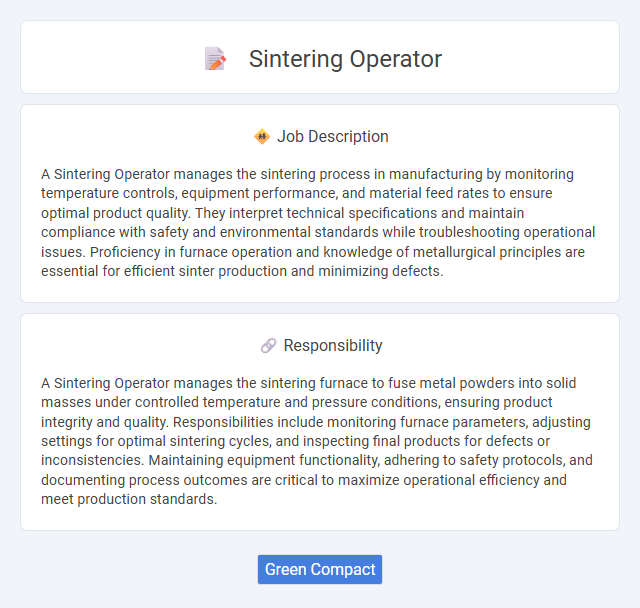
A Sintering Operator manages the sintering process in manufacturing by monitoring temperature controls, equipment performance, and material feed rates to ensure optimal product quality. They interpret technical specifications and maintain compliance with safety and environmental standards while troubleshooting operational issues. Proficiency in furnace operation and knowledge of metallurgical principles are essential for efficient sinter production and minimizing defects.
Individuals with strong attention to detail and the ability to operate heavy machinery might be well-suited for a Sintering operator role. Candidates who can work in high-temperature environments and tolerate extended periods of standing or physical activity are likely to perform effectively. Those with limited manual dexterity or low tolerance for heat might find this job challenging.
Qualification
A Sintering operator typically requires a high school diploma or equivalent, with specialized training in metallurgy or materials science preferred. Proficiency in operating sintering furnaces, understanding temperature control, and monitoring machine parameters are essential skills. Strong attention to detail, mechanical aptitude, and the ability to adhere to safety protocols enhance job performance and ensure quality output.
Responsibility
A Sintering Operator manages the sintering furnace to fuse metal powders into solid masses under controlled temperature and pressure conditions, ensuring product integrity and quality. Responsibilities include monitoring furnace parameters, adjusting settings for optimal sintering cycles, and inspecting final products for defects or inconsistencies. Maintaining equipment functionality, adhering to safety protocols, and documenting process outcomes are critical to maximize operational efficiency and meet production standards.
Benefit
Sintering operator positions likely offer benefits such as competitive wages and opportunities for skill development in advanced manufacturing processes. Employees may experience improved job stability due to the essential role sintering plays in producing high-quality metal parts. Health and safety benefits could be emphasized given the industrial environment, contributing to overall job satisfaction.
Challenge
The sintering operator role likely involves consistently monitoring and controlling complex temperatures and material mixtures, which could pose significant challenges requiring precision and technical expertise. Managing equipment maintenance and troubleshooting may frequently test problem-solving skills under tight production schedules. Operators might encounter variability in raw materials that demands adaptability and quick decision-making to maintain product quality and efficiency.
Career Advancement
Sintering operators play a crucial role in metallurgical manufacturing, overseeing the sintering process that transforms raw materials into solid, usable forms for steel production and other industries. Mastery in operating sintering machines, monitoring temperature controls, and ensuring product quality creates opportunities for promotion to senior operator, production supervisor, or process engineer roles. Continuous skill development and certifications in metallurgical processes significantly enhance career advancement prospects in this specialized field.
Key Terms
Green Compact
The Sintering Operator manages the sintering process specifically for Green Compacts, ensuring proper temperature and atmosphere control to achieve optimal density and mechanical properties. This role involves monitoring furnace conditions and adjusting parameters to prevent defects such as warping or cracking in Green Compact parts. Expertise in metallurgical principles and experience with industrial sintering equipment are essential for maintaining production quality and efficiency.
 kuljobs.com
kuljobs.com